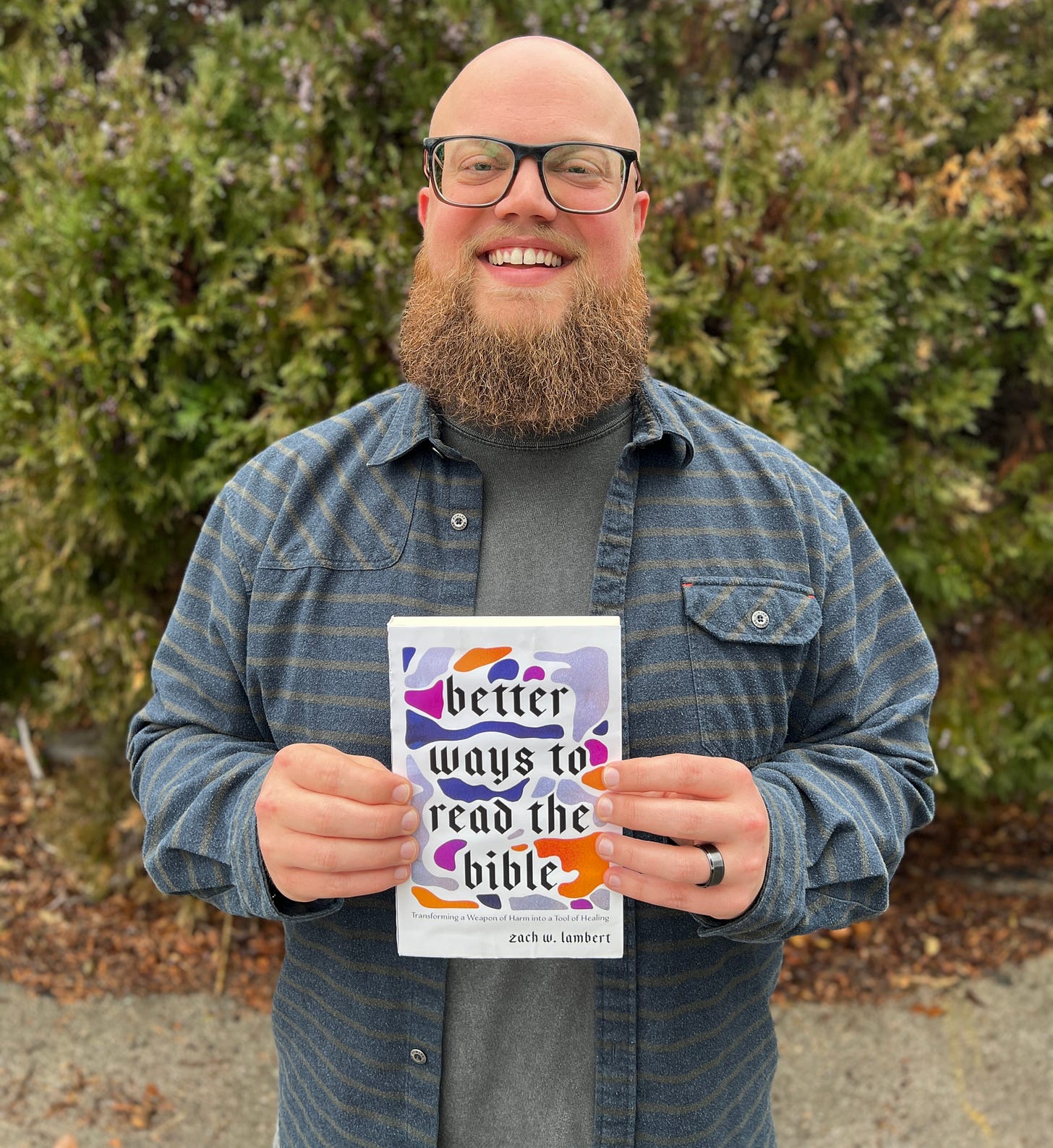I’ve developed something of an allergic reaction to the adjective, “biblical.” This allergy developed inside the church, not out.
“Biblical” manhood or “biblical” finances or “biblical” culture — it was a neat and tidy way to apply authority to a teaching without critically examining the content of the teaching—something that theology itself is supposed to do.
But the danger of this “biblical” adjective isn’t confined to the church. Not when DHS is pushing propaganda with Bible verses, or when Presidents stand in front of a church holding a Bible for a photo shoot.
I once heard the Archbishop of Canterbury describing the use of the Bible in UK politics. He said UK culture (and this also applies Stateside) has developed under the shattered canopy of Christendom. Now politicians wield the shards as either weapons against their opponents, or shibboleths for their followers. This metaphor resonated, deeply. It named what I had seen in the church and in society. It set me on a course to understand what the Scriptures are and what authority they convey.
Theologian Karl Barth, in his essay “The Strange New World of the Bible,” argued that we get what we bring to the text:
The Bible gives to every person and to every era such answers to their questions as they deserve. We shall always find in it as much as we seek and no more: high and divine content if it is high and divine content that we seek; transitory and "historical" content, if it is transitory and "historical" content that we seek—nothing whatever, if it is nothing whatever that we seek.
But aside from this, and quite opposite to it, Barth maintained that the Bible still speaks in spite of all our misuses, in spite of our tendency to slap the adjective “biblical” on a teaching and justify ourselves:
The Bible tells us not how we should talk with God but what he says to us; not how we find the way to him, but how he has sought and found the way to us…[for] The word of God is within the Bible.
As Barth in his day, now in ours, we are always in need of a fresh unsettling of our stagnant receptions of the Scriptures. And that’s why I’ve been looking forward to sitting down with Pastor, doctoral student, and author
to discuss his new book, Better Ways to Read the Bible.I had the privilege of meeting Zach and preaching at Restore last month. And I’m grateful for him. In a world of promos and influencers, we’ve lost something of the personal. I turned around between services and saw Zach taking the time to speak with a parishioner, and wanted to capture it because I want you—the reader—to see just a snapshot of the offline, in person, pastor that Zach is.
Here is an excerpt of our conversation on being biblical in a fresh ancient way:
JARED: Why write a book about the Bible right now? What about our time makes this book so needed?
ZACH: Over the past ten years, we have seen a sharp rise in Christians publicly supporting violence, racism, homophobia, oppression, and hatred. These views are often accompanied by hand picked bible verses, pulled out of context and used to endorse people and policies that are directly opposed to the way of Jesus. What is happening more publicly now is not new, though. The Bible has been used throughout the centuries to support genocide, slavery, conversion therapy, child abuse, and on and on. While we can’t do anything to right those wrongs, we have the ability to reconsider, to learn, and to advocate for a better way forward. If Better Ways to Read the Bible prompts even one person to reconsider the toxic theology they have been handed, it will have been worth it.
JARED: You grew up in evangelical spaces like me where the Bible or what is “biblical” is dictated and not open for discernment. What do you say to the slogans, “the Bible is the Word of God” Or “God says it, that settles it!”?
ZACH: So many of us were told that there is only one way to read the bible, the Evangelical “plain reading,” and that anything outside of that view is blasphemy. We all come to the bible with our own lenses, experiences, and understandings; to say otherwise is ridiculous, and there is no such thing as a “plain reading.” The Evangelical interpretation of scripture is just that: one way to interpret scripture. It is a set of lenses, a framework for interpretation, that continues to prop up the ideology that has bred Christian Nationalism, reinforced white supremacy, supported the subjugation of women, and so much more.
Evangelicals [in America] don’t want you to know that there is a rich and diverse history of biblical interpretation that is solid, sound, and in favor of abundance and flourishing for all people. This is why Evangelicals ostracize and demonize anyone who deigns to step outside of those bounds and consider the interpretation of womanist interpretations, liberation theologians, and more, citing heresy and calling them “unbiblical.” Once we are exposed to new and, frankly, better interpretations, those in power within Evangelical spaces can no longer control our understanding of a very big, very loving God. Better Ways to Read the Bible is a summation of the lenses we learned and those that may help us see scripture in a healthier, more holistic way.
JARED: You talk a lot about the harm of the apocalyptic way of reading the Bible. As a pastor, how do you handle books like Revelation and Daniel?
ZACH: Both churches I grew up in, as well as the seminary I graduated from, used the apocalypse lens to claim that Revelation contains a hidden code that can be used to decipher events leading up to the end of the world. It was presented like a secret message written in invisible ink on the back of the Declaration of Independence, and we are all like Nicolas Cage, doing whatever we can to solve the riddle and save the world.
I actually spend a significant amount of time in the book, almost an entire chapter, discussing how damaging this “Left Behind theology” is when it comes to how we engage with Revelation and Daniel. But I don’t think the answer is to ignore apocalyptic biblical literature. In that same chapter, I explore better ways to read Revelation centered on how evil is at work in the world and how we can faithfully follow Jesus by standing against it.
Revelation was written with the primary goal of encouraging early Christians to continue following the way of Jesus while under the thumb of the oppressive Roman Empire and to help them find hope in the fact that God is at work to end all oppression. Even though Revelation was written to the first-century church, choosing the way of Jesus over the way of empire is vitally important for the twenty-first-century church too.
JARED: Our politicians quote the Bible on either side of the aisle. Many non-Christians and fellow citizens would push back at the notion of the Bible influencing public life. Does the Bible in your view have anything to offer our common political life? And what is it?
ZACH: This is a great question. While I believe that the bible (when understood properly) is instructive and helpful in the lives of individuals, I fully respect the separation of church and state. We are not winning people over by demanding their conformity to something they have come to know as harmful and hateful. I am encouraged by some of the Christians I know who are working on behalf of their constituents to provide safety, security, and wellness in their roles as civil servants; however, I am appalled by the actions of many other political figures who claim the name of Christ and do exactly the opposite of what I believe Jesus teaches.
I’ll give you an example. I have been very outspoken against the push to have the ten commandments posted in every Texas classroom. At my sons’ public school, over thirty-nine countries are represented within the student body. We have learned so much from those who are different from us and our kids are better for it. I will continue to work toward the protection of religious freedom for the children and families in Texas public schools as it is a fundamental right within our country. I hope it stays that way.
There is nothing Christlike about dominating others and shoving our religion down their throats. Jesus didn’t do this and neither should we. We are seeing the rotten fruit of Christian Nationalism birthed from the idea that America is a “Christian Nation.” This is a dangerous concept and a thinly veiled attempt to use Christianity as a cover for racism and xenophobia.
JARED: How does Jesus factor into how we approach the diverse set of Scriptures that we have inherited?
ZACH: Your use of the word “diverse” here is important: scripture is a compilation of a broad swath of writings from various people in different places across different times and for varying purposes. The Psalms are not intended to serve the same purpose as the Pauline epistles, the Torah, or the apocalyptic books. We have to understand the differences in author, genre, and purpose in order to have a tight grasp on the story the bible is telling us. The whole of scripture points to Jesus as our primary example of how to move and live on earth. He is the bible’s central theme. If our interpretation of scripture contradicts the work and/or person of Jesus, it is incorrect. If we misunderstand this, we will consistently misinterpret and misrepresent the story of scripture.
JARED: What’s something you hope every reader walks away with from spending time in your book?
ZACH: It really depends on where you are in your journey. If you’re someone who has been wounded by bad Bible interpretations, I hope this book is a healing balm. If you’re someone who is so triggered by the Bible that you struggle to even open it, I hope this book helps you slowly and safely reengage it. If you’re someone who doesn’t understand how faithful Christians can think outside of the typical Evangelical constructs, I hope this book demonstrates that people who love the Bible often disagree. If you love someone who is in relationship with people who wield the Bible like a weapon, I hope this book helps you have healthy conversations with them and push back against the harm they are causing.
Thank you for reading The Homeward Dispatches. If you are reading this and benefited from the conversation, please consider subscribing or sharing. Thank you!
is the pastor of Restore Austin, co-founder of the Post-Evangelical Collective, a current doctoral student at Duke Divinity, and the author of “Better Ways to Read the Bible” which release August 12, 2025. You can find Zach online at his Substack, on Instagram, X, and Threads.







You knocked it out of the park when you preached at Restore last month and I'm honored that you would share my book here, Jared. So grateful to be in this work together!
Thanks for this interview. Now I’m looking forward to the book!